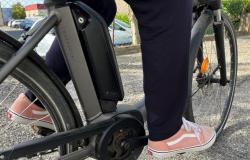Buy tasty tomatoes, a piece of cheese or a fillet of fish without being stuck in your wallet. This is the principle of Social Food Security (SSA), a concept tested almost everywhere in France and soon in Dieulefit (Drôme). A collective, made up of two employees and around forty active volunteers, is working on the issue.
Calibrated by income
“We would have offices open to the public and a grid which would indicate that with such an income, the contribution is this much,” explains Julie Yon, member of the SSA collective. This would unlock an allowance to spend in approved places: in producer shops, with farmers or artisans, for example. »
The poorest would have a lower contribution than their allowance, and vice versa for the wealthiest, in order to create a balanced system. “Everyone could eat with dignity. » What would be the advantage for those who contribute more? “They would participate in another model of society and would also protect themselves, in the event of unemployment or illness for example. »
“Behind, there is the idea of transforming our production model”
Supported by the City and the community of municipalities, the collective carried out an experiment in the form of a market (read elsewhere). “For us, this has always been temporary. » Last April, a Local Food Committee was created. He will devote himself to the SSA. “We chose 22 people representative of society, according to criteria of age, gender, income, household composition or even length of service in the region. » They will work on two thorny points: the amounts of contributions and allowances and the agreement criteria. ” It’s not simple. There are questions of locality, label… to which the answers are not binary. Behind it, there is the idea of transforming our production model. »
The collective hopes to launch a pilot phase at the end of 2024 before generalization to the community of municipalities. “As with health with Social Security, food would become a collective matter. There is an eminently public health issue in this, underlines the woman who is a professional nurse. Obesity, diabetes and even hypertension are diseases linked to diet, which are found more in the most precarious populations. »
The Lavoir market experiment
In September 2021, Mathieu Yon launched an innovative system at the Dieulefit Lavoir market. The market gardener offered, with around ten producers, three prices: fair (cost price), solidarity (30% more expensive) and accessible (30% cheaper). The surplus was donated to a fund, also supplemented by a similar system set up in a bakery and a market in neighboring towns. “It worked well,” concludes Julie Yon. The overall system was in balance but we were in deficit at the Lavoir, in particular because we made sure to reach disadvantaged groups and we did not settle in this neighborhood by chance. » Last December, the experiment ended. “We had gone all the way and we wanted to devote ourselves to Social Food Security. »






